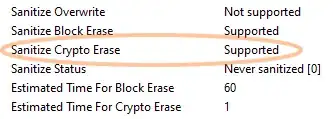I'm concerned about speed changes of the Samsung MZ-M5E1T0BW 850-EVO when hardware encryption/decryption is enabled. I can't find any information in the data sheets. Do you guys know if there is a (significant) loss of read/write speed when the hardware encryption is enabled? Thanks!
2 Answers
The performance drop with Samsung Self Encryption Drive (SED) is quite small according to this table from Storage Visions 2014. Also SED offers twice the speed of software encryption.
| MB/Sec | no encryption | SED | S/W encryption |
|---|---|---|---|
| Startup | 82.50 | 95.33 | 47.90 |
| App Loading | 48.33 | 60.37 | 30.70 |
| Modest size file test | 41.13 | 50.40 | 26.77 |
| Large Scale Data Read | 178.00 | 169.33 | 70.23 |
| Large Scale Data Write | 170.80 | 164.50 | 63.60 |
- 5,693
- 910
Modern SSDs are so called "SEDs" or "self encrypting drives". On modern SSDs (and other SEDs) encryption is simply always on. The drive encrypts the data whether you want it or not.
The encryption is simply a part of the drive’s normal operation.
On https://www.crucial.com/support/articles-faq-ssd/overview-hardware-encryption we read:
"The hardware encryption of an SED however, is integrated into the controller, which means there is no impact on SSD performance either in the short term or in the long run. The read and write speeds are already taking encryption into account, because it already happens on every write cycle and decryption happens on every read cycle. The encryption is simply a part of the drive’s normal operation."
And ..
"All a user needs to take advantage of an SED’s encryption ability is a software utility that provides encryption key management for SED devices. Crucial SEDs are fully compliant with the Microsoft® eDrive standard, which provides simple plug-and-play data security through the use of Windows® BitLocker®. Because Windows BitLocker doesn’t need to encrypt the drive before it can be used (that has already been done by the SSD’s controller) there is no delay or wait for encryption to take place. After Windows BitLocker is enabled, the SED is instantly ready to use. All you have to do is let the Self-Encrypting Drive operate just the way it has all along, and enjoy the peace of mind and high performance of a hardware-based encryption drive."
IOW, the drive is always encrypting anyway.
I suppose a quick way to check if for example your NVMe SSD is self-encrypting is look for crypto erase support. Crypto erase simply 'throws away the key' making data unrecoverable and then resets the drive's FTL so every sector you read from the drive returns zeros.
